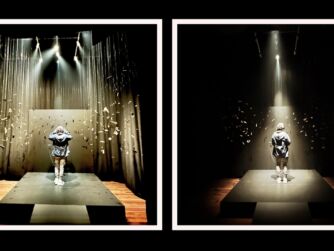Mark Schramm talks about his Darkfield space dogfight VR experience that includes cooperative missions that you can do with your fiends.
 For Mark, part of the biggest potential of VR is to be able to go anywhere and do anything with your friends, and so he wants to designing VR experiences that you wouldn’t be able to complete on your own. He talks a bit about the networking options to be able to host your own game with your friends, and some of the design considerations in order to create a more satisfying social experience in VR.
For Mark, part of the biggest potential of VR is to be able to go anywhere and do anything with your friends, and so he wants to designing VR experiences that you wouldn’t be able to complete on your own. He talks a bit about the networking options to be able to host your own game with your friends, and some of the design considerations in order to create a more satisfying social experience in VR.
There’s currently 4 days left on the Darkfield Kickstarter, and so check it out and help make it happen.
Theme music: “Fatality” by Tigoolio
Rough Transcript
[00:00:05.412] Kent Bye: The Voices of VR Podcast.
[00:00:11.935] Mark Schramm: My name is Mark. I'm a developer of Darkfield VR together with two of my friends, Daniel and Martin. Darkfield VR is a co-op space dogfighting simulator. So instead of fighting against your friends or against random people, you're going to fight with your friends in co-op missions. Just think like Payday or Left 4 Dead, but in space and no zombies. So we're going to have a co-op mission-based focus. Right now we're working on one mission, which is taking down a big space station. So you're one of four elite fighter pilots. You're gonna attack the space station, it's heavily armored, it has squadrons of fighter pilots around it, it has a shield, so there's no way of just flying just in and just taking it down. So, one of your friends has an experimental EMP device. He's gonna charge this device, it's gonna take around two minutes, and for those two minutes he can use the device, take down the shields, your other friend is gonna use a nuke, gonna blow a hole inside to the wall of the space station, and you will take your smaller ship, you're gonna fly in, you're gonna destroy the reactor, you're gonna ride a shockwave back out and save the day.
[00:01:08.859] Kent Bye: I see. And so you're kind of creating a gameplay where people have to really collaborate and do different functions. How do they know what specific function to do?
[00:01:16.524] Mark Schramm: So we're going to have a mission briefing in the beginning. And it also depends on your character. If your character is the only one carrying the EMP, and EMP is part of the mission, then you know what to do. So right now, we're going to run a Kickstarter on September 26. With the Kickstarter, we're going to hire voice actors. We're going to hire 2D and 3D artists to actually create a mission briefing. One of our backer rewards for the Kickstarter is going to make it possible for you to record a mission briefing for us. So we're going to inform the player while he's playing it and if you've got enough voice actors also while he's playing the mission.
[00:01:48.922] Kent Bye: And so yeah, I think virtual reality is going to be a medium where social interactions are going to be very key to the types of experiences people have. So it sounds like you're trying to facilitate that type of social interactions. And so what are some of the things within the actual mission that people would need to actually communicate with each other or synchronize their behaviors or their actions?
[00:02:10.268] Mark Schramm: So actually the fun thing is going to be the way how you communicate. Even though we have spaceship and shields and EMPs, our radio technology is sort of stuck in the 60s. Think of cheap walkie-talkies. You have only one channel, a single band. So once you start sending and talking to your friends, they can't answer in real time. You have to let go of your send button so they can talk to you. So you not only have to coordinate your way you are attacking the space station, You also have to coordinate how you're coordinating with your friends. And this sort of gives not only an incentive to probably plan stuff out, because you just can't ask again afterwards why someone else is talking, but also it adds a lot to the immersion on, like, you're limited, you are one of four fighter pilots, you're fighting against a whole army of other ships, and you have limited technology and you only have one shot of doing this right, like, following the plan, otherwise you're just not gonna make it.
[00:03:01.541] Kent Bye: And so you are working with other people on creating this experience and so talk a bit about that process of as you're playtesting it, you know, actually running it through with other people and what type of things you've learned or had to change based upon your actual experiences of playing this.
[00:03:15.875] Mark Schramm: So the way we do our playtesting, because we're only a team of three people, we've been in Early Access since November 2013. And our active community of Early Access backers helps us a lot in refining our gameplay and our game mechanics. Our first alpha was merely a crappy, broken prototype. And we got feedback from the community, sometimes really loud feedback from the community, especially if something is horribly broken. But now we are creating a game that the community wants to play. And if they have a feature, they can request it on our forum. We can talk about that. If they have problems, we can talk about that. And outsourcing this to our community not only gives the community a sense of being part of the project, but also helps us on finding out exactly what people want to play.
[00:04:00.835] Kent Bye: And so what's been some of the changes that you've made to your game based upon user feedback of what types of experiences people want to have?
[00:04:08.777] Mark Schramm: For example, one thing we realized that, especially when looking at people when they're playing, is that they stop moving their head. In a space game, when your weapons are aligned with your ship movement, you stop looking around because there's no incentive for looking around. So that was actually one thing that we saw that people started looking around when they started playing the game, just look at the cockpit, look out of the window, but at once in the actual dogfight, they just stared straight ahead. It's like suddenly their neck just locked in one position and they never moved it again. So we included that you can aim with your head inside a 22 degree radius. So inside a small radius you have to aim with your head and suddenly that unlocks the muscle memory. Suddenly people remember, yes they can move their head, suddenly they look out the window, they try to track enemies with their eyes, with their head. And that's one thing that you would have never realized without the community.
[00:04:58.112] Kent Bye: And so can you look to the side and start to shoot off to the side or can you only shoot looking straight forward then?
[00:05:04.502] Mark Schramm: There's a small radius where aiming is based on your head rotation. You can't just look straight 90 degrees to the side and start shooting to the right. Your weapons are mounted on rotatable platforms, so if you have a Gatling gun that's only shooting towards your front, you can move it 11 degrees to the left, to the right, to the up and down. but not in other directions. We're going to have ships that have a gunner position that has rotatable 360 degrees, so people can turn around fully 360 degrees and shoot enemies at the back while looking at it, which is also going to be awesome with the final version of the Rift that probably has 360 degrees tracking.
[00:05:42.840] Kent Bye: And so maybe talk a bit about the networking component of having multiplayer in a virtual reality experience. How were you able to actually implement that?
[00:05:51.487] Mark Schramm: So we are using the Unity game engine. And instead of relying on a plug-in, we're actually using Unity's own networking solution that enables us being independent from other systems. So our game, as long as your computer is reachable via its IP address or has a connection to our master server, people can join you. The thing that we hate the most is when you all bought games and we came together on LAN parties and then we can't play together because we don't have an internet connection, because we have to request an online server or we had to be logged in in the last 24 hours. So we don't have any DRM in Darkfield. If you bought a game and you want to play with your friends, just start your server and your friends can join. And especially in virtual reality, multiplayer is such an enticing thing to have because suddenly you're not alone anymore, you're not isolated in the Rift anymore, you're actually playing with your friends and you know your friends are out there. You know your friends are in the ship next to you and it's so close and they can support you when you need help.
[00:06:49.568] Kent Bye: What are some of the experiences that you want to have in this type of collaborative environments? What type of quests do you want to go on?
[00:06:57.309] Mark Schramm: So I want to really have the feeling that I'm working closely together with my friends. I don't want to just shoot them down and see them die. I want to achieve something with them. In Darkfield, it's taking down bigger space structures, it's escorting civilian fleets, it's robbing a space convoy. But ultimately, I love the concept of the Metaverse. I would love to see it. I would love to see that happen. I would love to just instantly walk around with my friends and be with my friends anywhere in the world at any time.
[00:07:25.762] Kent Bye: And finally, what do you see as the ultimate potential for virtual reality?
[00:07:29.625] Mark Schramm: I think it sort of relates to what I just said. The ultimate potential is that suddenly you can be with anyone, anywhere, at any time. I think something similar, Brandon said something similar today. Giving you the possibility of actually seeing your friends, being with your friends that are maybe thousands of miles or kilometers away, I'm from Germany and I live in Australia right now and what I miss most are my friends back in Germany. So just hanging out with them on Skype or Google Hangout just doesn't do the job. In the end I think the best thing virtual reality can do is unite us, make the world a lot smaller.
[00:08:08.805] Kent Bye: Great. And is there anything else that's left unsaid that you'd like to say?
[00:08:12.830] Mark Schramm: I just want to repeat that we're going to start our Kickstarter on the 26th of September. And we're not going to ask for much, so please help us make the Scope Space game happen. Great.
[00:08:22.381] Kent Bye: Well, thank you so much. Thanks. Thanks a lot.




